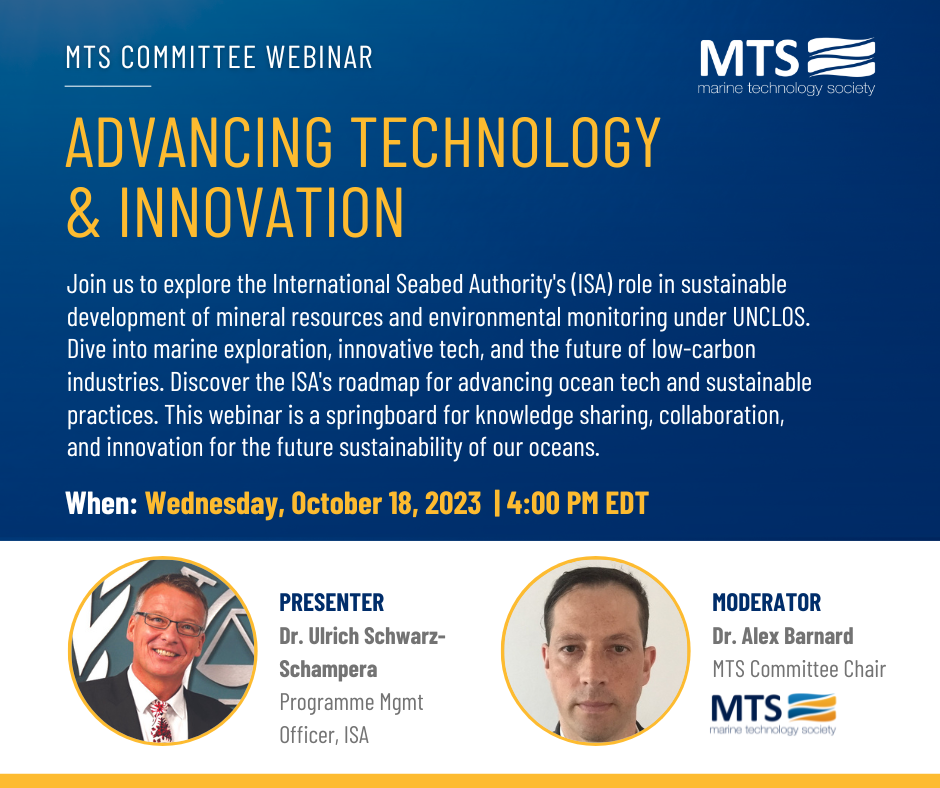|
MTS Marine Mineral Resources Committee Webinar with Dr. Ulrich Schwarz-Schampera, International Seabed Authority
Wednesday, October 18, 2023, 4:00 PM - 5:00 PM EST
Category: Virtual Event
Webinar: Advancing Technology and Innovation for the Sustainable Development of Mineral Resources and Environmental Monitoring in the International Seabed Area
|
|
Join us to explore the International Seabed Authority's (ISA) role in sustainable development of mineral resources and environmental monitoring under UNCLOS. Dive into marine exploration, innovative tech, and the future of low-carbon industries. Discover the ISA's roadmap for advancing ocean tech and sustainable practices. This webinar is a springboard for knowledge sharing, collaboration, and innovation for the future sustainability of our oceans. |
Date/Time:
Wednesday, October 18, 2023 | 4:00 PM EDT
Presenter:
Dr. Ulrich Schwarz-Schampera
Abstract:
In accordance with the UN Convention on the Law of the Sea (UNCLOS) and the 1994 Agreement relating to the implementation of Part XI of the Convention, the International Seabed Authority (ISA), on behalf of the States Parties to UNCLOS, is mandated to administer the mineral resources located in the international seabed area (the Area) for the benefit of mankind as a whole. ISA is tasked to control and organize current exploration activities, as well as future mining activities, in the Area. In so doing, ISA has the obligation to take the necessary measures to acquire technology and scientific knowledge; and to promote and encourage the transfer to developing States of such technology and scientific knowledge relating to activities in the Area so that all States Parties benefit therefrom.
ISA contractors’ activities currently include 22 contractors and 31 contracts for three types of marine minerals: Polymetallic Manganese Nodules (PMN), Polymetallic Massive Sulphides (PMS), Cobalt-rich Ferromanganese Crusts (CFC). Contractors’ exploration activities represent the driving force in marine research, following the regulations for required baseline studies on the seabed and the water column above. The request for reliable and high-resolution assessments has resulted in the development of technologies for multiple tasks related to exploration (high-resolution measurements, mineral identification, resource assessment) and environmental baseline surveys. The application of modern technologies will inform environmental assessments on a global scale, contribute to close important knowledge gaps and assist in the identification of critical habitats to assist the BBNJ process to define suitable marine protected areas.
Marine exploration, potential future exploitation for marine minerals, and effective environmental monitoring are emerging fields of activities to ensure future access to raw materials for low-carbon industries from common sources with less environmental impact. It furthermore attracts advanced technology, intelligent, low-impact and remotely operated solutions which allow for environmentally sustainable recovery and monitoring under deep-sea conditions. It also contributes to ISA’s marine scientific research (MSR) action plan in the definition of knowledge gaps and the increase of scientific understanding through the application of new technological concepts, tools and digital opportunities.
It is in this context that the ISA secretariat seeks to develop a technology roadmap with concrete results and partnerships that facilitates the full implementation of UNCLOS, allowing ISA and States Parties to initiate and promote:
- Programmes for the transfer of technology to the ISA Enterprise and to developing States with regard to activities in the Area, including facilitating the access of the Enterprise and of developing States to the relevant technology, under fair and reasonable terms and conditions;
- Measures directed towards the advancement of the technology of the Enterprise and the domestic technology of developing States, particularly by providing opportunities to personnel from the Enterprise and from developing States for training in marine science and technology and for their full participation in activities in the Area.
The ISA Secretariat has identified five areas of priority including (i) Ocean Observation and Communication, (ii) Monitoring, (iii) Autonomy, Automation, Robotics, (iv) Machine Learning by Artificial Intelligence, (v) Mining, Energy and Metal Processing. For each of the priorities, possible leaders were identified to carry out consultations with relevant stakeholders to promote relevant technologies in joint efforts and inform interested stakeholders by multiple ways of reporting.
Moderator:
Dr. Alex Barnard, Chair MTS Marine Mineral Resources Committee
Alex Barnard is a scientist, father, and educator. He has a PhD in Marine Geoscience from the University of Houston and works in both industry and academia. He is the founder of an online education company, and serves as a review board member for two academic journals.


 Prev Month
Prev Month View Month
View Month Search
Search Go to Month
Go to Month Next Month
Next Month
 Export Event
Export Event